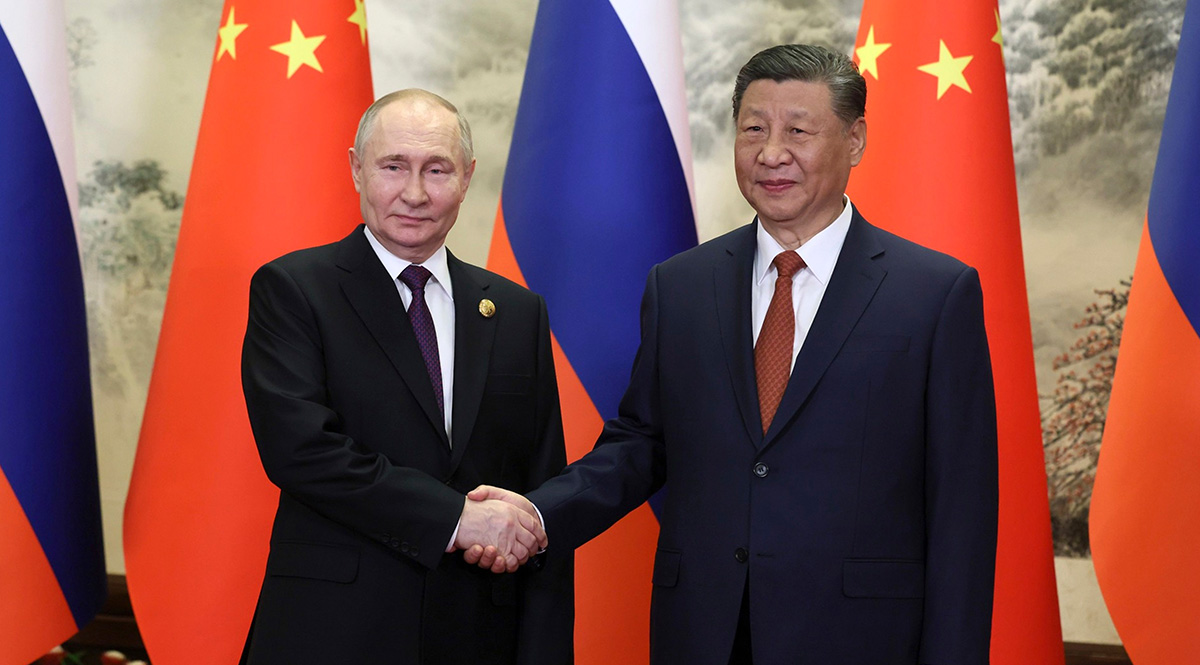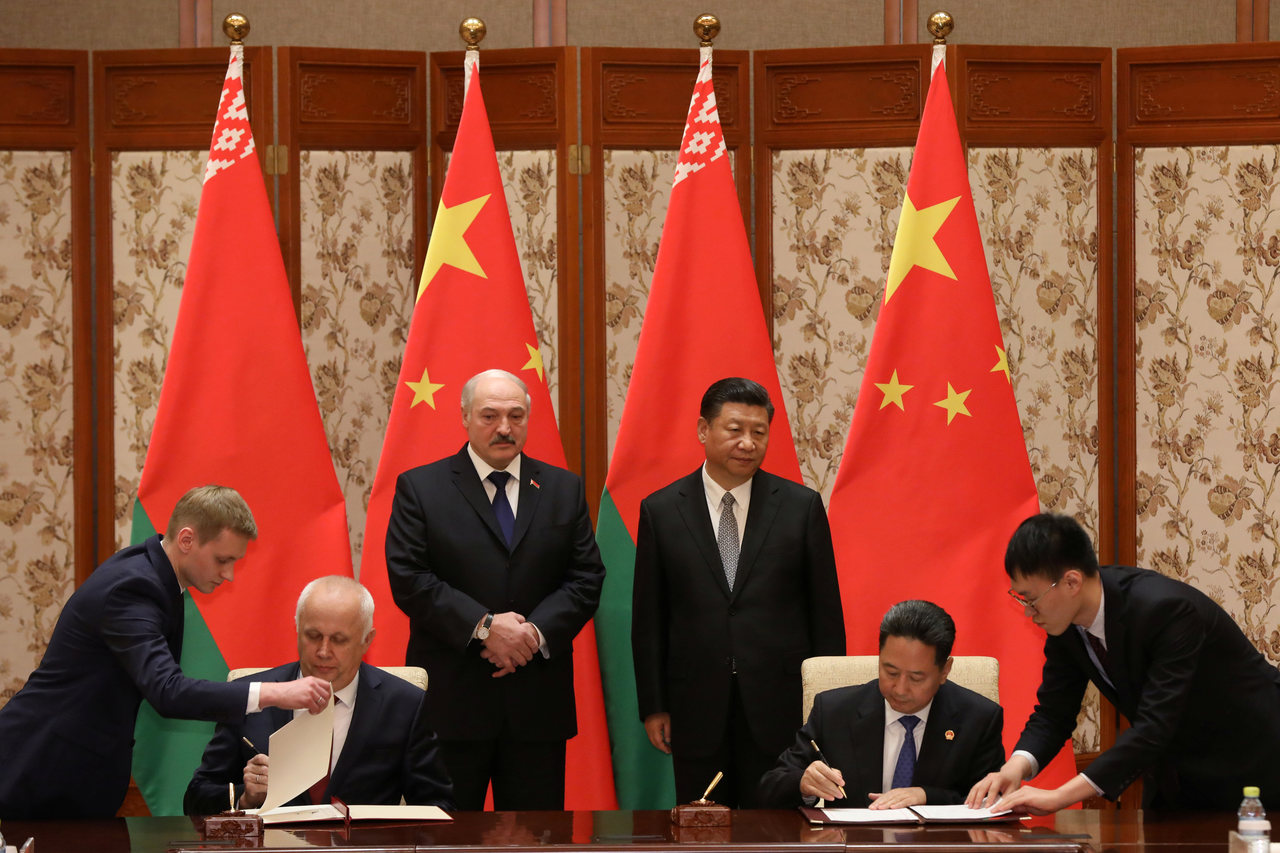Putin's Visit to China - Strengthening Strategic Cooperation
Vladimir Putin’s visit to China (16-17 May) was his first foreign trip after his inauguration for a fifth term as Russian president. It confirmed the continuation of strategic cooperation between the two countries, including China’s support for Russian policies towards the EU, NATO, and Ukraine, as well as Russia’s war economy. The statement issued by Putin and Xi Jinping indicates that both countries will focus on building a new international order, aiming to bring the countries of the Global South into the initiative.
 Kremlin Pool/Russian Presential / Zuma Press / Forum
Kremlin Pool/Russian Presential / Zuma Press / Forum
What were the objectives of the Russian visit to China?
Putin’s intention in visiting Beijing and Harbin was to emphasise the strategic partnership with China and to demonstrate that Russia is not only not internationally isolated but also is developing relations with partners that oppose the West’s dominant position in the world. Developing cooperation with China is crucial for Russia for economic, military, and political reasons because both countries are seeking to shape a new multipolar world order. For Russia, China’s support in waging war against Ukraine is also important, both on a political and military level (including the supply of dual-use technology).
To China Putin took a number of ministers, including the former and current defence minister, governors and heads of major state-owned corporations (mainly from the energy, raw materials, and banking sectors). This indicates expanding cooperation between the two countries in many areas of the economy, including energy, automotive, and agriculture. The visit also inaugurated the Chinese year in Russia and the Russian year in China, becoming part of the celebrations of the 75th anniversary of the establishment of diplomatic relations. Both countries regard them as an example of peaceful cooperation despite the conflicts of the 20th century.
What did Xi Jinping expect?
From Xi’s perspective, the choice of China as the first destination for a visit after the inauguration of Putin’s presidency was significant in terms of image—it confirmed China’s primacy in bilateral relations, as well as the willingness of the two countries to cooperate strategically in the competition with the U.S. Putin’s visit was meant to confirm Russia’s willingness to strengthen this cooperation and to set a further framework for it, beneficial to China’s interests, especially as the international situation is good for them, as confirmed by Xi’s recent visit to France, the German and French declarations of readiness for economic cooperation, and the German and Swedish opposition to the EC’s tightening trade policy towards China, including anti-subsidy proceedings against Chinese electric vehicles. This may mean that, in Xi’s view, the importance of China’s support for Russia in EU-China relations is waning. The unfavourable situation on the frontline in Ukraine, the possible change of it after the unblocking of U.S. aid, the upcoming NATO summit in Washington, and the dynamics of the U.S. election campaign further increased Xi’s willingness to talk to Putin.
What was agreed in bilateral relations?
Talks were held in a tight circle (Xi, Putin, and their closest associates, about 10 people, gathered at a dinner on 16 May), presumably on China’s support for Russia’s war economy and planned actions vis-à-vis the U.S. and the EU, but details were not publicly disclosed. Following the delegation’s official talks, a programmatic statement on the development of the Russia-China strategic partnership was published. Its main thesis is the destabilising role of the West (the U.S. is explicitly mentioned in the document), including in Ukraine and the Asia-Pacific region, in contrast to the peaceful and development-oriented cooperation between China and Russia. Both countries declared that their cooperation is not based on one-off benefits, but on the fundamental interests they share. The statement also asserted the coordination of military activities, the strengthening of Sino-Russian financial cooperation as a hedge against sanctions, in the nuclear energy sector, and artificial intelligence. These topics were also discussed during Putin’s talks with Premier Li Qiang. Russia declared support for, among other things, Chinese claims in the South China Sea and against Taiwan, as well as for strengthening relations with the countries of the Global South. In addition to the statement, a list of specific agreements was also revealed, including on facilitating Russian beef exports to China, and as many as three cooperation agreements between Chinese and Russian media organisations.
What was agreed on the issue of the war in Ukraine?
One of the most important topics of discussion was the issue of the war in Ukraine. Xi referred to China’s Global Security Initiative as a ready template for action, once again pointing out that the basis for solving the “Ukraine crisis” is the construction of a new European security architecture, to which Russia positively refers. In a joint statement, both sides stressed that the principle of indivisibility of security is needed to end the war. In Russia’s view, this means that an increase in the security of one country must not negatively affect other countries, which is why Ukraine’s membership of NATO is unacceptable. Russia and China internationally will promote this principle as one of the most important parts of building a new global security architecture. The two countries will also support each other by making proposals to end the war by aiming to subordinate Ukraine to Russia, as evidenced by Putin’s support for Chinese ideas to end the conflict. Russia and China also oppose the expansion of NATO and will cooperate against U.S. interests. Expanded military and technological cooperation between Russia and China, including their arms industries, is also to be expected.
What were the outcomes so far of the visit?
The effects of the visit confirm the maintenance of strategic cooperation between China and Russia. The political dimension, related to anti-Western rhetoric at the highest level, is complemented by intensive working contacts at the level of heads of government and ministers of individual ministries. The Chinese position does not indicate that it is limiting its support for the Russian economy, including the supply of dual-use goods. The declaration by China and Russia of military coordination and joint exercises (including in the Asia-Pacific) may increase security risks for Western countries. The agreements on mass media concluded during the visit further suggest that coordination on disinformation and manipulation is developing among European countries and the U.S.
At the same time, apart from the talks on Ukraine, the topic of relations with the EU did not come up explicitly during Putin’s visit, which may confirm China’s desire not to antagonise relations with the EU, in line with the positive assessment of the results of Xi’s recent visit to France. Both countries stressed the need for education about the Second World War in the current situation of attempts to “resurrect Nazism and militarism”. They also declared cooperation on climate change, an area in which the EU is seeking to maintain communication with China. The tone of Putin’s talks in Beijing, however, leaves no doubt as to China’s intentions to help Russia and participate in the creation of a new world order, which implies the need to strengthen EU derisking and intensify sanctions on Chinese companies for supporting Russia.





.jpg)
